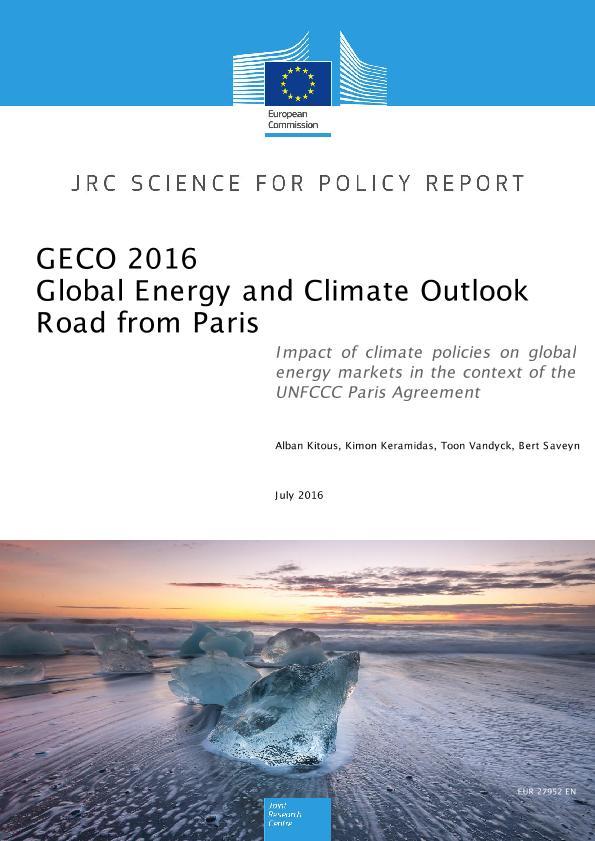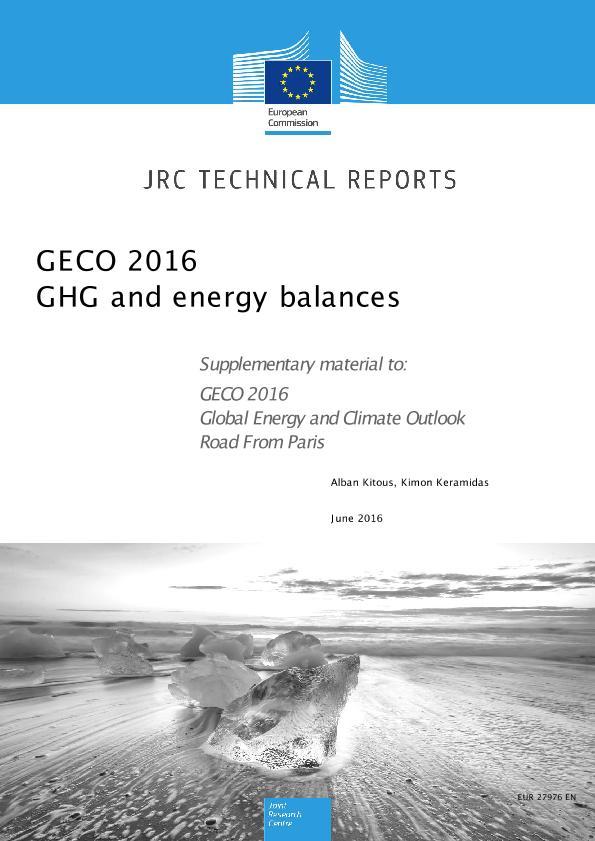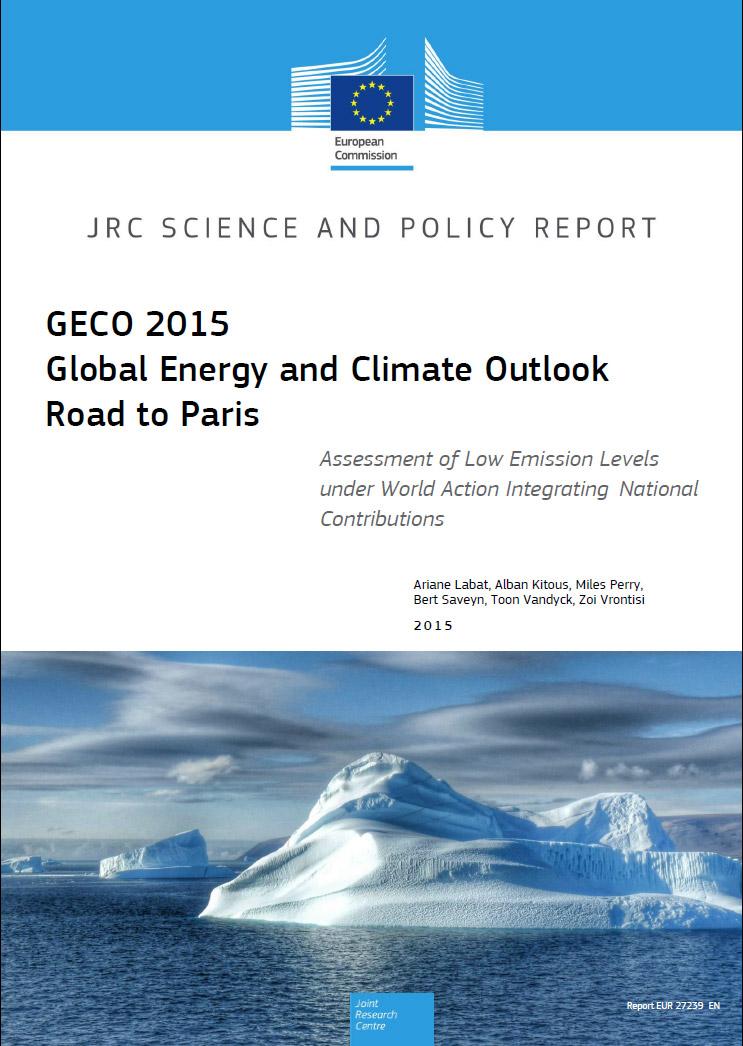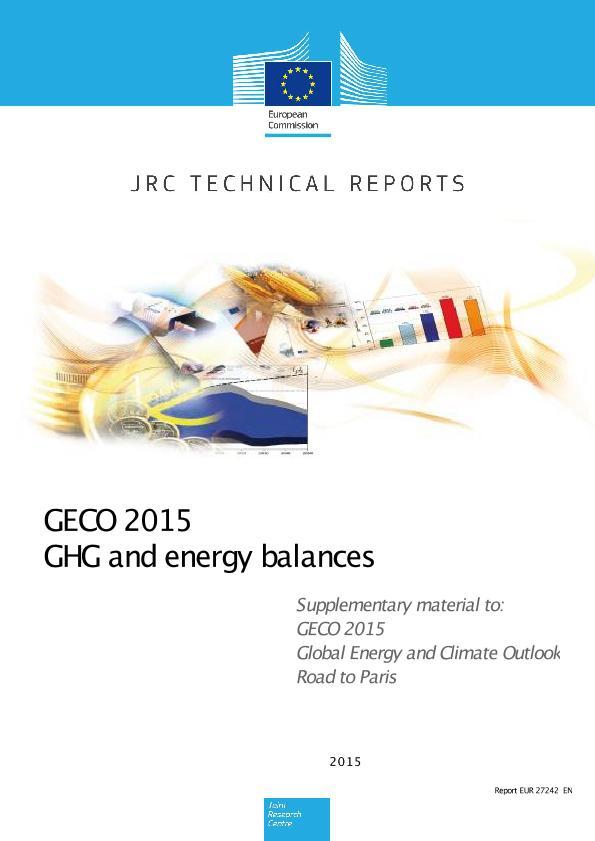GECO 2016 Global Energy and Climate Outlook: Road from Paris
GECO 2016 - Policies considered
GECO2016 examines the evolution of the world energy system and of greenhouse gas emissions to 2050 under several energy and climate policy configurations. Taking into account the outcome of the UNFCCC COP21 and using recent energy and economic data, this report aims at contributing to the international discussions and to the preparations for the future global stock-taking exercises.
It presents an analysis of several low-emission development pathways, achievable through the aggregate effect of national policies or through globally coordinated action, illustrating some of the economic challenges and opportunities for specific energy markets, sectors and technologies.
The report includes:
Several scenarios: economy-energy scenarios to 2050 developed for this report, with a description of key macro assumptions on population and GDP growth and the scenario-specific policies considered. Four scenarios are considered in this report:
- a Reference scenario, which mostly takes into account all adopted policies for the 2020 time horizon;
- a 2°C scenario that aims at respecting the long-term 2°C target with a high probability, implying very rapid action in line with the recommendations of the IPCC AR5 report;
- an INDC scenario that assumes the full implementation of the 2025-2030 country objectives submitted throughout 2015.
- Outlook of greenhouse gases emissions, how they evolve across scenarios and what mitigation options are undertaken in each scenario.
- Outlook of the energy markets in the context of climate mitigation policies, including the evolution of primary energy supply, energy supply by fuel, the power sector and final energy demand. It also looks at the future evolution of energy prices and investment needs in broad terms for energy supply and more specifically for the power sector.
- Specific case studies that were developed as thematic variants to the central scenarios. It describes in particular a sustained low oil price and a phase-out of fossil fuel subsidies.
- Macro-economic implications of climate mitigation strategies.
Notes: the average yearly evolution of emission intensity of GDP is given for each scenario; total GHG emissions excluding LULUCF sinks.
GECO2015 has been authored in close collaboration with DG CLIMA.
GECO 2015 Global Energy and Climate Outlook: Road to Paris. Assessment of Low Emission Levels under World Action Integrating National Contributions
This report presents the modelling work quoted in the EC communication "The Paris Protocol - a blueprint for tackling global climate change beyond 2020 - in the EU's Energy Union package. It examines the effects of a Baseline scenario where current trends continue beyond 2020, and of a Global Mitigation scenario in line with keeping global warming below 2ºC. The analysis uses the POLES and GEM-E3 models in a framework where economic welfare is maximised while tackling climate change. In the Baseline, emissions trigger +3.5ºC global warming. In the Global Mitigation scenario, all regions realise domestic emission cuts to stay below 2ºC, with various profiles in 2020-2050 depending on their national characteristics.
A significant transformation of the energy systems and non-energy measures enable regions at all levels of income to move to a low-emission growth pathway. Sectors linked (directly or indirectly) to carbon-intensive processes adjust their investments to be competitive in a low-emission environment.
A significant number of regions draw economic benefits from shifting their expenditures on fossil energy imports to investments. GDP growth rates are marginally affected in most regions by global efforts to reduce emissions. Crucially, high growth rates are maintained in fast-growing low-income regions. Economic costs are reduced further when countries use emission permit auction revenues for other tax reductions. Delaying actions to stay below 2ºC add large economic costs.
Related Content
Poster: Climate Policy Improves Air Quality And Saves Lives
JRC Policy Brief: Analysis of scenarios integrating the INDCs
Communication by the European Commission: "The Paris Protocol - a blueprint for tackling global climate change beyond 2020"
Leaflet: Science for Climate Action




